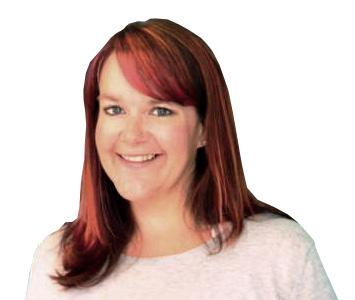
4 minute read
A Grandparent’s Guide to Sex Ed
Growth & Development
Jennifer Gibson, MA, is also known as “The Sex Lady”—officially now for over 15 years in Greater Victoria!—to the thousands of amazing youth and adults she is lucky to educate and learn with through her job as the Coordinator of Community Education at Island Sexual Health. She’s passionate about making sexuality education as positive, fun and non-cringe-able as possible.

A Grandparent’s Guide to Sex Ed
It comes as no surprise that in the past few years, as many grandparents spend more time with their grandchildren and often in more carecentred roles, many have started asking how they can best support their grandchildren’s sexuality education. Most commonly, grandparents tell me that the BIG questions their grandchildren are comfortable enough to ask, inspire the grandparents to want to learn more.
As our society becomes more open, honest and accepting about healthy sexuality, grandparents might feel that they missed opportunities to speak with their own children while they were growing up, and they want to change that with their grandchildren.
Sometimes this openness brings concern that sexuality conversations will create more curiosities and confusion for their grandchildren. I am always thrilled to squash these concerns with the fact that global research has repeatedly demonstrated exactly the opposite! In fact, when children are well informed about sexuality, this information satisfies age-appropriate curiosities and becomes a protective factor for their health and safety.
I believe the best way for grandparents to begin to support the growth of their grandchildren’s knowledge is to understand the approaches and philosophies their parents are using. Are they using the “all questions are good” approach and allowing children to guide their conversations through questions? Are they sitting down for more directed chats using books as teaching tools (a personal favourite approach that works great for extended families!)? Or are they utilizing safe and factual websites such as those at Amaze.org to provide information?
Knowing the answers to these questions will help you as grandparents to understand both the amount of information your grandchildren have received and, most importantly, the tone in which it’s being delivered. You can then support the information that has already been offered and best choose how to grow their knowledge in ways that respect family approaches.
Grandparents often share with me that they are surprised (usually pleasantly!) by the specific language their grandchildren are using. Understanding the language which families are using to describe bodies, identities, and relationships is an integral piece for effective education. Sexuality education begins with simple, intentional use of scientific language to describe all areas of the body equally includ-
ing the genitals. Using these terms at times when you’re caring for their personal needs like during bath time or toilet training situates the language naturally. If you find that you haven’t used such specific language often enough to become comfortable, practice! Practice using the terms (nipples, vulva, testicles, nipples…) while you’re vacuuming.
Using scientific language for all body parts teaches children that all parts of them are important and none are shameful or embarrassing. This knowledge and practice helps our children to ask for help, healthcare and/ or support when they need it with less apprehension and more confidence.
Grandparents are vital to the understanding and practice of consent. Children (and adults!) shouldn’t feel obligated to offer and accept physical affection. For children to understand consent, we must allow them to witness and practice this skillset in their earliest and most influential personal relationships—with family. This means when you’re so full of love for them that you want to “squish” their face, you ask them first. Again, this may be a new practice that takes some time to feel comfortable and natural.
Rest assured that when your grandchildren observe (and they are always watching/listening/absorbing!) a person being invited to share physical affection using language as simple as “Would you like a hug?”, it reminds them they have a choice and to expect that their needs and boundaries will be respected. This will set a solid course for future relationships they’ll be in. For the grandparents, this means accepting their wishes with grace even if it means missing out on the face squish.
Whether you’re practicing science terms like vulva and penis at bath time, finding an answer to a BIG question, or asking before you squish their lovable face, you can be assured that your support and guidance will serve them and you well in the future.
Kids Say the Darndest Things
I cherish the memory of an incident that took place many years ago when I was the exhausted young mother of a challenging three-year-old girl and her lively redheaded infant brother.
On this particularly chaotic day, I reached breaking point. Loudly asserting my need for “just a little peace and quiet,” I popped the baby into his crib and marched sassy Sarah to her room for quiet time before collapsing on the couch with a magazine and cup of tea.
A few minutes later Sarah crept out of her room, cradling in her hands her most precious treasure: a tiny gilded cardboard gift box. Tiptoeing up to me, she proffered this peace offering.
I opened it to find…nothing. Just an empty box.

Smiling softly, she whispered “It’s a piece of quiet.”
Jacqui Graham










